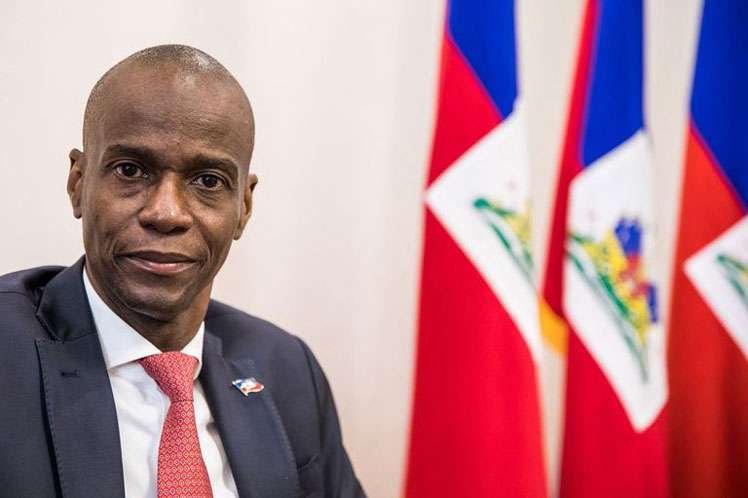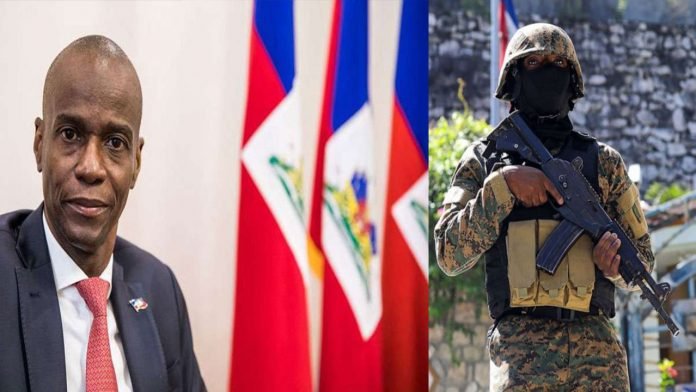Haiti police battle gunmen who killed president, amid fears of chaos
More than 200 years after slaves on the island of Hispaniola led a successful rebellion against French colonial government and proclaimed their liberty and independence, Haitians still aren’t free. The state is a predator and the rule of law remains elusive. A narrow cartel of special interests controls most of the economy.
Didier Le Bret, a former French ambassador to Haiti, said the situation in Haiti had become so volatile that “many people had an interest in getting rid of Moïse.”
He said he hoped Mr. Joseph would be able to run the country, despite his lack of political legitimacy.
Mr. Le Bret criticized the international community for ignoring the volatile political situation in Haiti and said it should now come help the country “to ensure a smooth transition.”
Haiti’s security forces were locked in a fierce gun battle on Wednesday with assailants who assassinated President Jovenel Moise at his home overnight, plunging the already impoverished, violence-wracked nation deeper into chaos.
The police had killed four of the “mercenaries” and captured two more, Police General Director Leon Charles said in televised comments late on Wednesday, adding that security forces would not rest until they had all been dealt with.
“We blocked them en route as they left the scene of the crime,” he said. “Since then, we have been battling with them.”
“They will be killed or apprehended.”
Jovenel Moïse was killed in an attack on his private residence on the outskirts of the capital, Port-au-Prince. The authorities said late Wednesday that they had intercepted “suspected assassins.”
Four people suspected of being involved in the assassination of President Jovenel Moïse of Haiti were killed by the police in a gun battle and two others were arrested, Haiti’s police chief said late Wednesday. The chief, Léon Charles, also said that three police officers who had been held hostage were freed.
“The police are engaged in a battle with the assailants,” he said at a news conference, noting that the authorities were still in pursuit of some suspects. “We are pursuing them so that, in a gunfight, they meet their fate or in gunfight they die, or we apprehend them.”
The authorities did not name any of the suspects or cite any evidence linking them to the assassination.
Mr Moïse’s wife, Martine Moïse, was also shot in the attack, the interim prime minister, Claude Joseph, said in a statement. Ms Moïse was transported to a hospital in southern Florida for treatment.
“A group of unidentified individuals, some of them speaking Spanish, attacked the private residence of the president of the republic and thus fatally wounded the head of state,” the prime minister said, but there was little solid information about who might have carried out the assassination.
Haiti’s ambassador to the United States, Bocchit Edmond, told Reuters in an interview the gunmen were masquerading as U.S. Drug Enforcement Administration (DEA) agents as they entered Moise’s guarded residence under cover of nightfall – a move that would likely have helped them gain entry.
Fears of chaos and a power vacuum loom

Millions of Haitians anxiously huddled around radios and televisions throughout the day, staying off the streets as they tried to understand who killed the president, why and what the coming days might mean for the country. The assassination has created a political void that threatens to deepen the turmoil that has gripped Haiti for months.
The brazen assassination, which drew condemnation from the U.N. Security Council, the United States and neighbouring Latin American countries, came amid political unrest, a surge in gang violence, and a growing humanitarian crisis in the poorest nation in the Americas.
The government declared a two-week state of emergency to help it hunt down the assassins, whom Edmond described as a group of “foreign mercenaries” and well-trained killers.
The gunmen spoke English and Spanish, said interim Prime Minister Claude Joseph, who assumed the leadership of the country, where the majority speak French or Haitian Creole.
“I am calling for calm. Everything is under control,” Joseph said on television alongside Police General Director Charles. “This barbaric act will not remain unpunished”.
The U.N. Security Council condemned Moise’s assassination and called on all parties to “remain calm, exercise restraint and to avoid any act that could contribute to further instability.” The council is due to be briefed on the killing in a closed-door meeting on Thursday.
The U.N. Security Council expressed deep shock and sympathy over Moise’s death ahead of a closed-door meeting on Thursday, requested by the United States and Mexico, to evaluate the situation.
A U.N. peacekeeping mission – meant to restore order after a rebellion toppled then-President Jean-Bertrand Aristide in 2004 ended in 2019 with the country still in disarray. In recent years, Haiti has been buffeted by a series of natural disasters and still bears the scars of a major earthquake in 2010.
U.S. President Joe Biden denounced the killing as “heinous” and called the situation in Haiti – which lies some 700 miles (1,125 km) off the Florida coast – worrisome.
“We stand ready to assist as we continue to work for a safe and secure Haiti,” he said.
U.S. Secretary of State Antony Blinken, in a call with Joseph, expressed Washington’s commitment to work with Haiti’s government to support “democratic governance, peace, and security,” State Department spokesperson Ned Price said in a statement.
Many people in Haiti had wanted Moise to leave office. Ever since he took over in 2017, he faced calls to resign and mass protests – first over corruption allegations and his management of the economy, then over his increasing grip on power.
Lately, he presided over a worsening state of gang violence that rights activists say is linked to politics and business leaders using armed groups for their own ends.
Now, the political vacuum left by Mr Moïse’s killing could fuel a cycle of violence, experts warned.
More than two centuries ago, Haitians fought to throw off the yoke of colonial France and bring an end to one of the world’s most brutal slave colonies, which had brought France great wealth. What started as a slave uprising at the turn of the 18th century eventually led to the stunning defeat of Napoleon’s forces in 1803.
But the suffering of the Haitians did not end with the ouster of the French.
More recently, the country suffered under more than two decades of dictatorship by François Duvalier, known as Papa Doc, and then his son, Jean-Claude, known as Baby Doc.
In 1990, a priest from a poor area, Jean-Bertrand Aristide, was elected president. But in less than a year, he was deposed in a coup.
Since a devastating earthquake 11 years ago, the country has not rebuilt, and many say it is worse off, despite billions of dollars of reconstruction aid.
The United States, which is Haiti’s top aid donor and has long exerted an outsized weight in its politics, had on June 30 condemned what it described as a systematic violation of human rights, fundamental freedoms and attacks on the press in the country. The Biden administration urged the Haitian government to counter a proliferation of gangs and violence.
The Pan American Health Organization (PAHO) expressed concern on Wednesday that the violence could deal a setback to efforts to fight COVID-19 in Haiti – one of only a handful of countries worldwide that has yet to administer a single shot of coronavirus vaccine.
Support Independent Journalism Today
Our unwavering dedication is to provide you with unbiased news, diverse perspectives, and insightful opinions. We're on a mission to ensure that those in positions of power are held accountable for their actions, but we can't do it alone. Labour Heartlands is primarily funded by me, Paul Knaggs, and by the generous contributions of readers like you. Your donations keep us going and help us uphold the principles of independent journalism. Join us in our quest for truth, transparency, and accountability – donate today and be a part of our mission!
Like everyone else, we're facing challenges, and we need your help to stay online and continue providing crucial journalism. Every contribution, no matter how small, goes a long way in helping us thrive. By becoming one of our donors, you become a vital part of our mission to uncover the truth and uphold the values of democracy.
While we maintain our independence from political affiliations, we stand united against corruption, injustice, and the erosion of free speech, truth, and democracy. We believe in the power of accurate information in a democracy, and we consider facts non-negotiable.
Your support, no matter the amount, can make a significant impact. Together, we can make a difference and continue our journey toward a more informed and just society.
Thank you for supporting Labour Heartlands












